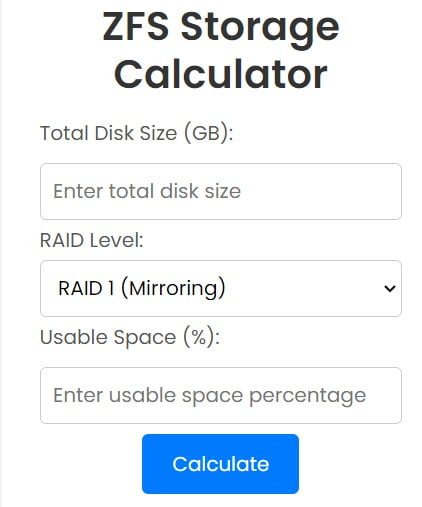Introduction to ZFS Storage Calculator
These days in the world that is driven by data, data storage management in the case of businesses of any size must be implemented efficiently. Among the best tricks for that case is ZFS (Zettabyte File System), recognized as the most robust, scalable, and compressive file system when it comes to data integrity. Though optimizing draws conditions like capacity planning, performance analysis, and RAID-Z configuration, it is a very complex activity. This is where budget calculators for ZFS storage calculator systems come into relevance.
Table of Contents
Understanding ZFS and Its Importance
ZFS is a unitary file system and volume manager that together with the volume manager, can handle a large amount of data and do it effectively. Fronted with technology, this platform provides a pooled storage facility, and data integrity approaches, as well as supports large storage capacities. ZFS in a similar manner is mostly deployed in enterprises, clouds, and data centers as a result of the system’s resilience and elasticity.
What is a ZFS Storage Calculator?
A ZFS storage calculator is a tool to calculate a storage system with ZFS requirements to determine storage capacity and performance. It includes variables such as disk capacity, RAID format, compression ratios, and job type undertakings in order to offer accurate storage capacity provisioning estimations.
How to Use a ZFS Storage Calculator
After giving the predicted factors as disk capacity, RAID level, Useable space, and workload characteristics the storage calculator will provide the correct estimate. Finally, the calculator will output comprehensive reports and reviews summarizing all the data entered into the app.
Benefits of Using a ZFS Storage Calculator
Accurate Resource Allocation
The ZFS storage calculators enable the creation of precise calculations of the storage requirements. This helps in preventing the cases of under-provisioning or over-provisioning of the storage resources which will eventually result in cost savings and efficient resource utilization.
Cost Reduction
Consequently, by now utilizing ZFS storage calculators enterprise organizations can reduce both hardware cost and operational expenses related with storage infrastructure.
Optimized Performance
Through investigating workload patterns and featuring the equipment configurations, users can deploy the flash storage with the most optimal performance to provide a consistent and trustworthy performance for users.
Common Challenges and Solutions
There is no doubt that the features of ZFS are of benefit, though, as with most things, with a solution of such power, its implementation involves various difficulties, like management of large data sets, balancing performance and capacity, and scaling infrastructure. ZFS calculators are explicit about users’ challenges and also tend to provide guides so as to help in addressing the challenges.
Comparison with Traditional Storage Calculation Methods
Typically, conventional storage capacity calculations heavily rely on approaches such as manual estimations and guess works which inevitably results in inaccurate outcomes and overlapping of storage resources. However, ZFS storage calculators come with flaws as they use advanced technologies such as algorithms and simulations to derive results that are more dependable and precise.
Real-world Use Cases
ZFS calculators have been the saving grace for industries such as finance, healthcare, media, and e-commerce to manage storage infrastructure, data handling, and business continuity, which are critical issues today.
Choosing the Right ZFS Storage Calculator
When selecting a ZFS storage calculator, organizations should consider factors such as ease of use, accuracy of results, support for advanced features, and compatibility with existing infrastructure.
Best Practices for Utilizing ZFS Storage Calculators
To increase the efficiency of ZFS storage calculators, companies should adopt best practices including updating input parameters on a regular basis, validating outcomes with real-world data, and communicating with storage managers to more accurately fit the setup of their programs.
Future Trends and Innovations
As ZFS storage capacity keeps expanding, we see the calculators becoming more complex with new attributes, like the onboard driving for future storage technologies, productivity examination, and cloud availability.
Security Considerations
When using the ZFS storage calculators security measures should be cautiously looked into and access controls and encryption systems should be applied so that the data in the systems are safe against the possible incidents of unlawful access and data breaches.
Conclusion
On this note, the ZFS storage calculator derived from the ZFS platform is a key tool in optimizing the storage ecosystem, allowing organizations to correctly compute the capacity plan, evaluate performance, and take wise decision-making actions concerning storage demand. In order to become efficient, reliable, and scalable storage solutions, veracious calculation is used with ZFS, which is a powerful calculation technique and advanced simulation techniques.
FAQs
- How big is the disk space for ZFS?
The disk space required for ZFS depends on factors such as data volume, redundancy settings, and growth projections. A ZFS storage calculator can help estimate the appropriate disk space based on specific requirements.
- What is the capacity of ZFS?
The capacity of ZFS can scale from small storage setups to massive data centers, offering flexibility and scalability for diverse storage needs. The actual capacity depends on factors like disk size, RAID configuration, and available hardware.
- How many disks do I need for ZFS?
The number of disks needed for ZFS varies depending on factors such as desired storage capacity, redundancy requirements, and performance goals. A ZFS storage calculator can assist in determining the optimal number of disks based on these parameters.
- How much RAM do I need for ZFS?
The amount of RAM required for ZFS depends on factors such as the size of the storage pool, the number of concurrent users, and the workload characteristics. Generally, ZFS benefits from ample RAM to cache frequently accessed data and optimize performance.


